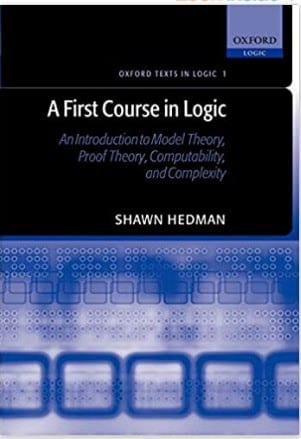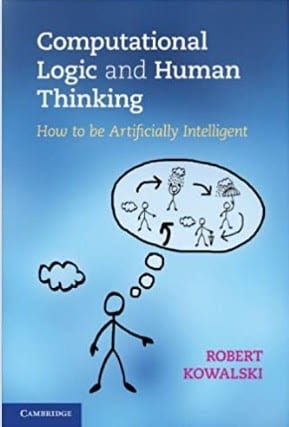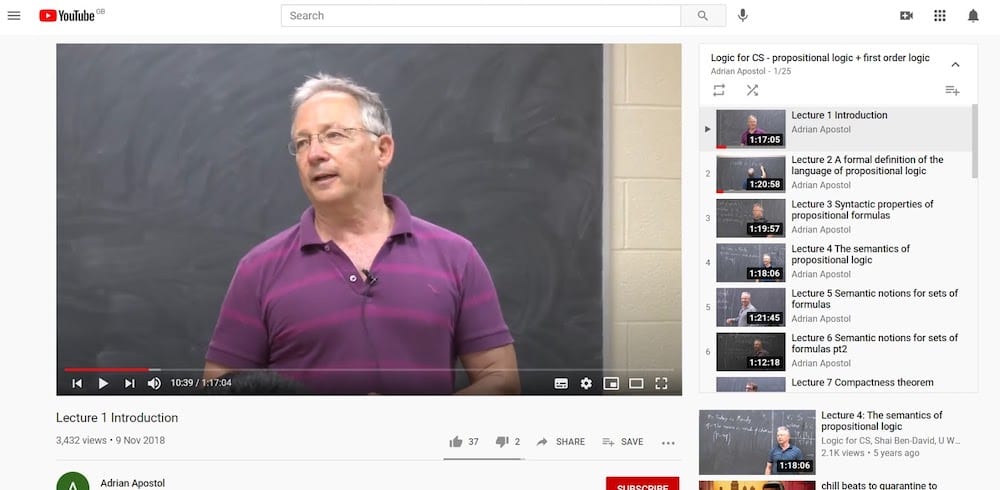Learning logical skills for computer science, math, and programming is as simple as taking courses and practicing. Once you understand computational logic and how to apply it, your coding skills, critical thinking skills, and problem-solving skills will become much stronger.
What Is Computational Logic?
Having a background in logic will help you explore the structure, design, and limitations of symbolic representations and procedures behind human thought and computer software. So, if your interests lie in computer programming, computer science, machine learning, or artificial intelligence, check out the logic courses below.
Types of Logic
There is more to logic than critical thinking and evaluating arguments. Logic also involves mathematics and computer science.
There are four different programming paradigms: procedural, object-oriented, functional, and logical. Together with math, these can be used to program different types of logic.
Formal Logic
The principal concept of formal logic is mathematical logic. It is the notion of computation and the study of algorithms. The foundations of computer science were first developed as a subsector of formal logic.
Inductive Logic
This programming is related to machine learning and uses first-order logic to represent data and hypotheses. Inductive programming is the process of solving a variety of problems in machine learning. These include regression, classification, clustering, and reinforcement learning, plus improving existing “upgrades” to propositional machine learning systems.
Propositional Logic
Propositional logic is concerned with which truth-value statements, true or false, that can be assigned to a program. The goal is to analyze the statements, either individually or as an amalgamation. Propositional logic consists of variables and connectives.
First-Order Logic
This is an extension of propositional logic. It considers the true and false statements within a partial view of the world, called a domain. As first-order logic can be proved mathematically, it can be used to represent all computational problems.
First-order logic is made up of syntax and semantics. The syntax is a formal language that is used to express concepts. The semantics of first-order explains how to detect the true value of any formula.
Second-Order Logic
Second-order logic has a minor role in the philosophy of mathematics. It incorporates for all properties into the syntax, while first-order logic can only say for all elements. This means second-order logic is usually stronger.
Simultaneously, it is debatably weaker than set theory in that its quantifiers range over one limited domain at a time. Comparatively, set theory takes the universalist approach in that its quantifiers range over all possible domains.
Learning Logic
Remember that your educational journey doesn’t always need to involve completing a university program on a topic. In some cases, like with learning logic, you may instead choose to take individual courses, attend coding bootcamps, or sign up for online tutorials.
For those of you who want to explore the programming side, the most common logic programming language is Prolog. But logic is not all about programming. It also involves understanding objects, functions, symbols, and data types.
How to Learn Logic: Step by Step
Below is a closer look at the steps you must take to become well-rounded in logic.
- Objects. The first step is to discover what “objects” are and what they do. Learn about object-oriented programming and how to interact with complex systems.
- Learn programming. Next is to learn about logic and the elements of programming. Discover how a computer thinks and solves problems.
- Functions and messages. Learn about print functions so that you can print your documents. This includes route mapping functions, define message functions, and send message functions.
- Data. Study data types, data storage, and variables.
The Best Logic Courses and Training

URL: https://www.pexels.com/photo/think-outside-of-the-box-6375/
Alt-Text: a chalk board with think outside of the box written on it
Caption: Learn to think about logic outside the box with these courses.
Learn about mathematical logic and the logic used in computer science. Career Karma has put together the best in-person and online logic courses, as well as free lessons and training.
In-Person Logic Classes
Due to the COVID-19 pandemic this year, it has become difficult to find in-person classes. Be sure to check your local area to see if there are any workshops or classes available to you. Meanwhile, below is our number one pick, based in California.
UC Berkeley
- Location: Berkeley, CA
- Course: Introduction to Logic Course
- Time: Varies
- Prerequisites: For undergraduate students at UC Berkeley
- Price: Varies
The UC Berkeley philosophy program offers students an introduction to logic. The course explores logic as a bridge between the humanities and STEM subjects. Studying logic at Berkeley will help students think critically, develop analytical skills, and understand abstract structures.
Free Logic Courses Online
Below are some free online courses to help you come to grips with formal methods of logic and critical thinking.
Future Learn
- Course: Understanding Maths and Logic in Computer Science
- Time: 4 Weeks
- Prerequisites: Experience in machine learning, data science, or statistical and machine learning modeling
- Price: Free
This CPD certified course will teach students the mathematical and logic fundamentals of computer science in an engaging way. It is a great course for beginners and for those who want to become computer science teachers.
Coursera
- Course: Introduction to Logic
- Time: 54 Hours
- Prerequisites: None
- Price: Free
This course, hosted by Stanford University, is an introduction to computational logic. Students will learn how to encode and reason with information using logical sentences, and will get a broad overview of logic technology.
Open Classrooms
- Course: Think Like a Computer: The Logic of Programming
- Time: 4 Hours
- Prerequisites: None
- Price: Free
This course is a great introduction to computational logic. It shows students how computers use objects in programming, make decisions, and run programs. This beginners’ course also explains functions and data in a simple way.
Open Learning Initiative
- Course: Logic and Proofs
- Time: Varies
- Prerequisites: None
- Price: Free
This introductory logic course is intended for students with a background in a wide range of disciplines including mathematics, computer science, drama, and creative writing.
Logic Books
If you’re looking for extra study material, or if you prefer to read up rather than enroll in a course, here are some excellent books on logic.

"Career Karma entered my life when I needed it most and quickly helped me match with a bootcamp. Two months after graduating, I found my dream job that aligned with my values and goals in life!"
Venus, Software Engineer at Rockbot
A First Course in Logic: An Introduction to Model Theory, Proof Theory, Computability, and Complexity, Shawn Hedman

This is a great book for those who want to learn first-order logic, second-order logic, proposition logic, proof theory, computability theory, and model theory. It also has graded exercises and is ideal for beginners.
Computational Logic and Human Thinking: How to be Artificially Intelligent, Robert Kowalski

The book focuses on the integration of logic with decision theory. It is essential reading for teachers and researchers who want to update their knowledge on developments in computational logic.
Online Logic Resources
The Internet is the logical tool to learn anything new. You can search for studies, tutorials, and tips on your own or check out our selected resources below.
YouTube.com

YouTube offers tutorials and deep-dives into just about any subject imaginable. One of our top picks is Adrian Apostol who has posted 22 exciting logic classes on YouTube.
Freecodecamp.com
Free Code Camp offers tutorials, articles, and other information on logic. This is an especially great resource for coders. Check out their article on Boolean Algebra Truth Table Tutorial: XOR, NOR, and Logic Symbols Explained.
Conclusion: Learning Logic is Key to Being a Programmer

Although it is not an easy topic to grasp, we hope that we have been able to give you a brief understanding of the logic that goes into machine learning programming. The important thing to remember is that logic combines human thinking with computer science. Think of it as the philosophical understanding of how computers behave.
According to the US Bureau of Labor Statistics, a computer research scientist earns a median salary of $122,840 per year. Therefore, it can be a worthwhile career to pursue as a student.
About us: Career Karma is a platform designed to help job seekers find, research, and connect with job training programs to advance their careers. Learn about the CK publication.



